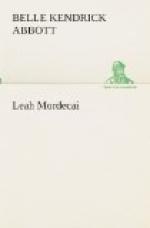Title: Leah Mordecai
Author: Mrs. Belle Kendrick Abbott
Release Date: January, 2004 [EBook #4955] [Yes, we are more than one year ahead of schedule] [This file was first posted on April 4, 2002]
Edition: 10
Language: English
Character set encoding: ASCII
*** Start of the project gutenberg EBOOK Leah mordecai ***
This eBook was edited by Charles Aldarondo (www.aldarondo.net).
LEAH MORDECAI. A NOVEL.
By Mrs. Belle Kendrick Abbott.
New York:
1856.
To my beloved uncle,
the Rev. J. Ryland Kendrick,
D.D.,
Whose hospitable home I once spent
many happy
days—days made for
ever bright by the love
of his great heart, love
that flowed like
A pure Stream from A crystal fountain,
abound and about my young
life—
this book is most tenderly
Inscribed by the author.
Atlanta, GA, November, 1875.
LEAH MORDECAI.
CHAPTER I.
The giant clock on the wall in the assembly-room of Madam Truxton’s fashionable school had marked the hour for dismission.
Groups of restless, anxious pupils stood about the apartment, or were gathered at the windows, watching the rain that had been falling in copious showers since morning. All were eager to go, yet none dared brave the storm.
Under the stone archway of the entrance to the assembly-hall, a group of four maidens stood chatting, apart from the rest, watching the rain, and impatient for its cessation.
“I know my father will either send my brother, or come for me himself,” said Helen Le Grande, “so I need not fear the rain.” Then, turning to the soft-eyed Jewess who stood by her side, she added, “When the carriage comes, Leah, you can take a seat with me. I’ll see that you are safely deposited at home.”
“Thank you, Helen, but it won’t hurt me to walk. Nothing hurts me—Leah Mordecai the despised.” Then, averting her face, the young girl gazed abstractedly into the street, and began humming in a low tone.
To these words of the young Jewess there was no reply. A certain sort of emphasis in her utterance seemed to forbid any inquiry, and silence any word of censure that might arise to the lips of her companions.




